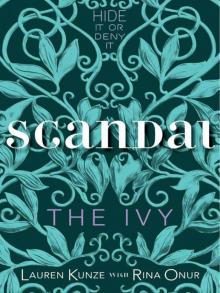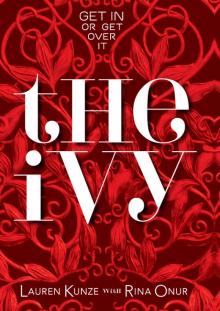- Home
- Lauren Kunze
The Ivy: Rivals Page 4
The Ivy: Rivals Read online
Page 4
His blue eyes honed in on her, and suddenly she felt trapped: torn between the urge to scoot away and to stay exactly where she sat. “How?”
Instead of speaking, he slid over to her, stopping when his knee just barely grazed her jeans. His fingertips were less than a centimeter from hers on the step above. She could see the faint, crescent moon–shaped scar on his chin, only an inch below his lips, as he leaned in, achingly close, until their noses were almost touching. There he remained, unmoving, staring at her with a challenge in his eyes.
Message received.
“I, uh, have to get to class,” she stammered, leaping up.
“Me too,” he said standing. “Where you headed?”
“The Barker Center.”
“Me too,” he repeated with mock well-isn’t-this-just-such-a-coincidence delight.
She narrowed her eyes. “Really.”
“Yep.”
“Well . . . I . . .”
“Aren’t you forgetting something?” he asked.
He had proved his point about being friends, so why was he still standing so close? “Um . . . wha—”
“This,” he said, snatching up her book bag.
“Hey!” she cried as he started to walk away.
“Better hurry,” he called over his shoulder.
Feeling slightly breathless, she ran to catch up.
“You didn’t have to walk me the whole way here—now you’re going to be late!” She and Gregory were standing in front of the double-glass and wood-paneled doors to the main seminar room in the Barker Center. Cool winter sunlight filtered down through tiny skylights in the impossibly high ceilings, dappling across the pale tiled floors. A green and gold banister rimmed the marble staircase leading upstairs, and a massive wooden archway on their right opened out into a cozy rotunda café.
“Can I have my bag back now?” Callie asked.
“Which class is this?” he retorted instead, peering through the glass at the students who were seating themselves around a huge mahogany table.
“Postwar Fiction and Theory, with that visiting professor Raja?” As she spoke, an elderly gentleman of Indian descent sporting a purple velvet blazer and huge horn-rimmed glasses slipped through the back entrance and assumed his place at the head of the table. “Why?” she asked, rounding on him. “What class do you—”
“Postwar Fiction and Theory, with that visiting professor Raja,” he answered with a wicked gleam in his eye, tossing her bag into her arms. Then, without a backward glance, he opened the doors and strode into the room.
She stared after him. He hadn’t attended last week’s seminar during Shopping Period. What was he trying to pull?
There was nothing to do but follow. Walking in, she took a seat opposite him. He beamed at her and pulled out a notebook and pen from the inside pocket of his coat. She frowned back, but his attention had suddenly shifted elsewhere, to somewhere behind her head. She turned just in time to see Alessandra bounding through the double doors, late as was—apparently—usual. Callie watched her slide into the seat next to Gregory. His eyes flickered ever so briefly at Callie before he leaned in and kissed her near the mouth.
Professor Raja cleared his throat. “My dear friends, thank you for joining our conversation today.” His British-Indian accent was so distinguished that anything he said would have sounded brilliant, be it about the central components of de Saussure’s structuralist theory of linguistics (signs and signifiers) or what he ate for breakfast (eggs and toast). “Now if you could all be so kind as to retrieve your copies of Mrs. Dalloway, which naturally you have all absorbed and digested since our last meeting . . .”
Hmfp—a tiny noise of triumph escaped Callie’s lips at the blank look on Gregory’s face as she plunked her copy of Virginia Woolf’s famous masterpiece on the table. Her smile faded a moment later when he leaned in to share with Alessandra.
“Now,” Professor Raja continued, “who wants to provide us with an analysis of the novel’s stream of consciousness mechanism insofar as it relates to the underlying issues of mental illness, existentialism, and feminism?”
The room stayed silent.
“Not properly caffeinated this afternoon, I see,” he murmured, looking amused. “Well, in that case, let us begin instead with the most deceivingly simple of questions. The novel takes place in a single day. Who can tell me what happens?”
More silence.
“Shy, are we?” Professor Raja commented. “Well, if there are no volunteers, I shall just have to pick one of you,” he muttered, shuffling his papers until he identified the class register. Twirling his finger above the page, he stabbed downward and smiled.
Callie swallowed.
“Miss Alessandra Constantine?”
“Uh . . . yes?” Perky Boobs asked in her low alto. Her forehead was creased, her full scarlet lips drawn in a pout. She looked like someone who could flirt her way out of anything—well, almost anything.
Professor Raja smiled tolerantly. “Shall I repeat the question, dear?” She nodded, and he did. Her face remained as blank as before.
Callie knew it was wrong to feel satisfied. Maybe Alessandra had the answer but felt paralyzed due to her proximity to Gregory, who Callie knew better than anyone caused a certain maddening, tongue-tying effect. Still . . .
“Well, Mrs. Dalloway is going to throw, like, a party—or soiree, in French—so she’s walking around town getting ready and buying flowers and stuff.”
Or soiree, in French? Clearly this girl needed to repeat Introduction to Bullshit 10a.
Professor Raja’s lips were thin and straight like a ruler.
“And honestly not a whole lot else happens, unless you count that Septimus guy who kills himself because he’s, like, traumatized. From the war and stuff.”
Professor Raja blinked rapidly, his eyes magnified and huge like an owl’s through the horn-rimmed spectacles.
“I mean,” Alessandra faltered, “that apart from the party with her husband and friends and her ex-boyfriend who also shows up, there isn’t too much going on. . . .”
Gregory, who had been fixated on the page in front of him, looked up suddenly. “I believe what Ms. Constantine is trying to say is that there isn’t too much, ah, ‘going on’ in terms of the action in the story because the majority of the novel takes place in the minds of the characters. The characters’ interior thoughts . . . supersede the exterior action, which, ah, renders these seemingly insignificant, ordinary everyday events—a glance, a touch, buying some flowers—significant and . . . well, extraordinary. Epic, even.”
Ah, and the man with a PhD in Bullshitology weighs in with a phenomenal—no, make that epic—rewording of the blurb on the back of the book.
Even Professor Raja seemed to buy it, nodding enthusiastically as he said, “Excellently put. Your name, young man?”
“Gregory Bolton. I’m a last-minute addition,” he added as Professor Raja scanned the register and appeared to draw a blank.
“Very good,” the professor said, making a note. “Now, Mr. Bolton, perhaps you’d care to elaborate on what you appeared to be suggesting was the paradoxically expansive nature of a seemingly ordinary day . . . ?”
Without hesitation Gregory launched into an analysis of the text, which, it soon became clear, he had read on a previous occasion. His words flowed as effortlessly as he could lob a squash ball into a perfect serve or secure a girl’s phone number with a single look—in the opposite direction. Callie felt strangely envious: not because of the way Alessandra, and every other girl in the room for that matter, was hanging on his words, but because for him, everything was so easy. He had been born with so much—smarts, looks, athletic ability, and more money than she would see in a lifetime—that he never even had to try. How, she wondered suddenly, could someone with everything be so insufferable 95 percent of the time?
“. . . So, as you can see, most of the novel takes place in memory,” Gregory concluded. “The central characters are preoccupied by the past,
obsessed in particular with the formative decisions that they made—decisions that may have been wrong.”
A few students had started taking notes, and Professor Raja’s head was in danger of popping off his neck from all the vigorous nodding. “And an example of one of these pivotal decisions might be . . . ?”
“Mrs. Dalloway’s—Clarissa’s—decision to marry Richard over Peter. In choosing Richard she is choosing practicality over passion: the promise of security and a stable life in exchange for . . . well, true love.” His eyes were trained straight ahead. Was it Callie’s imagination or had his face grown the slightest shade darker? He shrugged. “She spends the rest of her life regretting it.”
“No she doesn’t.” The words flew out of Callie’s mouth before she could stop them. Suddenly all eyes were on her. Professor Raja gave her a small smile. “Do go on, Miss . . . ?”
“Andrews. Callie Andrews. And I was just saying that . . . I disagree. I don’t think she regrets her decision. To marry Richard. Instead of Peter, who I’m sure we can all concur is extremely unreliable and incapable of reform, since he never stops chasing other girls and adventures, and is basically kind of a— well . . .” Callie swallowed, unsure if there was a seminar-appropriate synonym for the term man-slut. “The point is . . . that she is happy—very happy—with her choice.”
“That may be so,” Gregory cut in before Professor Raja could respond, “but is she really happy in the aftermath? Happy to play the part of the upper-class housewife to her politician? Because she never actually gives Peter an answer when he asks her,” he continued, picking up Alessandra’s copy of the novel and flipping through it, “on page—”
“It’s at the bottom of forty-seven,” Callie cut in smoothly. “Right after Peter tells her he’s having an affair with a married woman back in India while simultaneously checking out the maid; and right before he falls ‘madly in love’ with a complete stranger on the street and then follows her all around town!”
“Peter certainly has his flaws,” Gregory countered evenly, “but if he’s so screwed up, then why, on that same page forty-seven, does she think that, ‘If I had married him, this gaiety would have been mine all day’—”
“Fun does not equal stability,” Callie interjected. “And even though she sometimes has trouble remembering why she didn’t choose Peter when he’s around because he is quote ‘enchanting,’ that doesn’t mean Richard wasn’t the right choice; in fact, as Peter even says himself, compared to Richard he is a ‘failure’—”
“—or how about on forty-one,” Gregory continued, “when she reflects on how ‘impossible it was ever to make up my mind,’ and then wonders why she ever did decide ‘not to marry’ Peter ‘that awful summer.’”
“That summer,” Callie said through gritted teeth, “the most important relationship on her mind was with her best female friend, Sally Seton, with whom she shared the most quote ‘exquisite moment of her whole life,’ which of course Peter could never understand, self-centered egotistical narcissist that he is—”
“Everyone goes a little lesbian in college.” Gregory snorted. “Which is beside the point, anyway, because in present day Clarissa and Sally are barely even friends anymore—”
“Perhaps you two ought to reserve the rest of this debate for later,” Professor Raja boomed suddenly, “and allow us to hear from some of the other members of this class?”
Oh. Callie blinked. She had completely forgotten that anyone else was in the room. Blushing, she buried her nose in her book and barely glanced over the top of the pages for the remainder of class.
“You guys got a little intense back there,” Alessandra said, bridging the gap between Callie and Gregory as they all filed out of the seminar room, drawing them together against their will like an oxygen molecule binds two positively charged and therefore normally repellant atoms of hydrogen. “I’m going to have to step up my game!”
Callie stared at her.
“Harvard is, like, way harder than I ever would have thought,” Alessandra continued.
Oh. She means she’s going to have to start actually reading before class.
“We’re going to grab a late lunch,” Alessandra said, stopping in front of the café. “Won’t you join us?”
Callie’s eyes grew wide. “No—I, uh . . .”
“She has to be at work in Lamont in half an hour,” Gregory supplied.
“How did you know that?” Callie blurted.
Alessandra cocked her head.
Gregory shrugged. “Friends know other friends’ schedules.”
“Is that right?” asked Callie.
“Yep,” he said, throwing an arm around Alessandra’s shoulders and leading her into the café. “We’ll see ya later, pal.”
And so the two of them broke away, the bond “smashed to atoms,” just as Woolf had written.
Chapter Three
The War of the Roses
To all the gentlemen on campus:
Today is the thirteenth of February, meaning that tomorrow is the day you’re going to be in a whole lot of trouble unless—unlike most individuals possessing a Y chromosome—you miraculously remembered that tomorrow is not just Monday but also VALENTINE’S DAY.
Last week a Crimson editor published an article on their already flailing upstart, the so-called “more than daily news” FlyBy blog, claiming to be “What Every Harvard Student Needs to Know About Dating: A Guide in Ten Simple Equations.” Forgetting, for a moment, that “ten simple equations” is an incredibly moronic oxymoron, let’s take a moment to dwell on the disturbing statistic that came to light:
As a Harvard student, there’s a 69 percent chance you were your high school’s valedictorian. But there’s also a 90 percent chance you’re still a virgin.
To remedy these statistical shortcomings (only 69 percent valedictorian: come on, people!), the author launches into a mathematical analysis of dating involving a lot of if-then statements that seems guaranteed to fail the 2 percent of people on this planet who can even follow his logic.
More important, this piece proves once and for all—in less than twenty diagrams!—why they at the paper should stick to breaking news and leave the social side to our advice experts at FM.
But I digress. And so, without further ado, flow charts, diagrams, or equations:
Appropriate Valentine’s Day Gifts:
A Simple Pyramid Based on the Length of Time You’ve Been Together
A day: A card
A week: Flowers
A month: Chocolates
Six months–1 year: Jewelry
Year+: Really Expensive Jewelry
Not together yet: Tell her how you feel; anything else = creepy
Was that so difficult to parse? If so, then just remember this: whatever you do, don’t get her a freaking teddy bear.
Happy V-Day,
(And here’s hoping that some of you finally lose those V-Cards!)
Alexis Thorndike, Advice Columnist
Fifteen Minutes Magazine
Harvard University’s Authority on Campus Life since 1873
“Caliente, can I use your computer?” Mimi asked from where she was sprawled over the overstuffed chair in their common room.
“What did you just call me?” Callie demanded, looking up sharply from her reading assignment for Postwar Fiction and Theory.
“Caliente. It is Spanish. Gregory is teaching me. I switched to 101 because, after my C en français, they told me I would have to repeat the entry level une autre fois before advancing.”
Callie grimaced. Caliente had been Gregory’s special name for her . . . a long, long time ago. “Why do you need my computer?”
“I, er, mine . . . exploded?”
“Exploded?”
“Yes. Bang, bang? It was all the fault of Justin Bieber.”
Callie stared.
“She means she downloaded a bunch of music illegally,” Vanessa offered from where she sat on the floor, cutting paper hearts out of pink and red constru
ction paper. Apparently—as she had explained earlier to Mimi—if you taped them to the walls, they were like dream catchers but for valentines. Plus, it’s festive!
“You can get in real trouble with the administration for that!” Dana called, popping her head out of her bedroom. After a moment’s hesitation she plopped next to Callie on the couch, unable to resist the opportunity to lecture. “It’s in violation of the university code, and against the law. Students have been kicked out for less.”
“Well, I learned my lesson,” Mimi muttered. “Un cheval de Troie a mange mon ordinateur.”
“A . . . horse . . . ate your computer?” Dana scrunched up her forehead. “Is that like ‘the dog ate my homework’?”
Vanessa laughed. “A Trojan horse virus destroyed her operating system.”
“Oui, c’est tragique,” Mimi agreed. “Caliente? Se mueva, por favor! Ahora!”
“Yes, here you go,” Callie said, returning from her bedroom with her laptop and handing it to Mimi.
“Password?” asked Mimi, flipping it open.
“Calbear12,” Vanessa replied, seemingly automatically, cutting a large, pink heart from construction paper she had just folded in half.
Callie stared at her. “How did y—”
“Ah oui, c’est vrai,” Mimi cut her off, her fingers flicking over the keys.
“But—wait—you both know my password?”
“Yes,” said Vanessa, grabbing a roll of tape and standing. “Even if you weren’t the world’s slowest, loudest typist,” she explained as she stuck the first heart on the wall, “it’s not very difficult to guess.”
Mimi nodded. “One needs random letters and punctuation and numbers—”
“I have numbers. Twelve. That’s a number.”
“Oui,” said Mimi. “It is also the number on your football sweatshirt—”
“Soccer—”
“And your gym bag, and your seven pairs of football shorts—which, by the way, we are glad there are seven because they all look the same and we thought you were very dirty for a while.”
“You also sign all of your e-mails ‘Calbear,’” Vanessa chimed in. “At least, when you used to . . .” She trailed off, suddenly intent on taping a pink heart inside of a red one.

 Scandal
Scandal The Ivy: Rivals
The Ivy: Rivals The Ivy
The Ivy